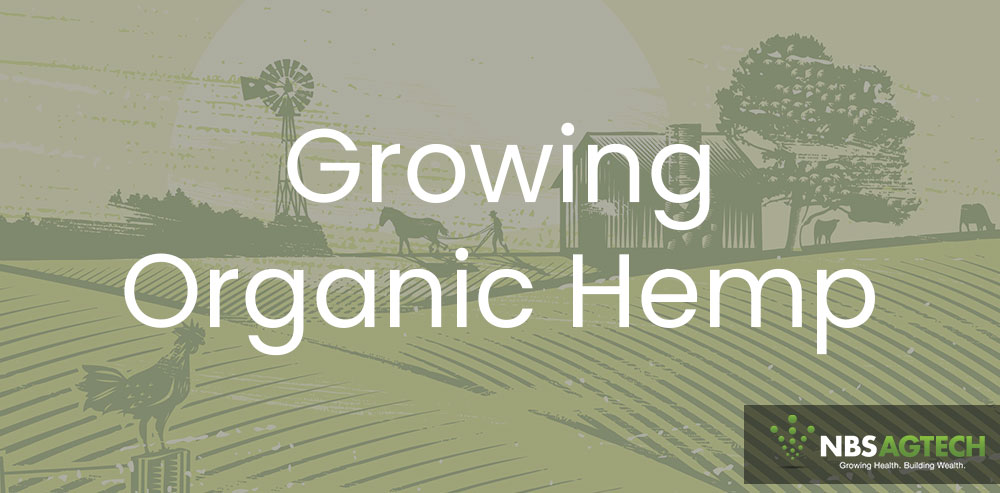
If you read our blog Hemp and Pesticides: Why Your Crop Can’t Have It, you are fully aware of why you can’t use pesticides on your industrial hemp crop. So what is the alternative for hemp farmers? Let’s take a look at some ways to successfully grow organic hemp.
What Makes a Crop Organic?
Organic farmers must adhere to regulations requiring them to use natural pesticides and fertilizers in order to get their crop certified as organic. In organic farming synthetic pesticides are prohibited, meaning any chemical that does not already and naturally exist in nature is not to be used on the crop. Furthermore, a true organic label further limits what can be used to control pests by not only limiting the ingredients that can be used but also the process by which the compound is produced. For example, a true organic label usually prohibits the use of compounds that were created by chemical synthesis. So the regulations on what can be used on your crop is not only limited to the ingredients of the compound but also to the method of its production.
Organic Crop Basics
Organic farmers use natural processes and materials when growing their crop. Let’s look at some of the basic practices used by organic farmers to ensure the organic integrity and crop viability.
Soil Fertility: When crops are grown in good and healthy soil they are more able to resist disease and tolerate insects. Since unnatural fertilizers are prohibited in organic farming, organic crop producers must find alternative and natural ways to ensure their soil is healthy. Organic farmers often add compost, animal manures, or green manures to their soil to help build soil quality. Additionally, they may use cover crops or mulches to protect the soil from wind or water erosion.
Seed Integrity: It is imperative to use organic seeds and planting stocks when growing an organic crop, or the integrity of the organic crop will be immediately compromised before cultivation has even begun. Seeds must not have been genetically modified or treated with any prohibited and unnatural substances, such as pesticides or fungicides.
Crop Rotation: Organic farmers often use crop rotation to help mitigate pest infestations. Rotating crops confuses insects and interrupts their life cycles. Successful crop rotations also help to ward off soil born plant diseases. In order to effectively reduce insect and disease by using crop rotation farmers will typically grow a crop from an entirely different plant family after their current crop is complete, and then wait a few years before replanting the initial crop in that same location.
Managing Pests, Weeds and Disease: Pest management and control on organic farms relies on the well-known “PAMS” method – Prevention, Avoidance, Monitoring and Suppression. With this strategy prevention and avoidance are used as the first line of defense against insects and pests. Monitoring for pests and insects must be an ongoing process throughout the entire life cycle of the crop. And if suppression of pests or weeds becomes necessary, organic farmers often try mechanical and physical practices first, before resorting to organic pesticides. Some examples of mechanical and physical pest and weed suppression tactics range from purposely releasing predatory insects to reduce current pest populations to utilizing thick mulch layers to smother out weeds. If suppression techniques such as the above do not work, as a last resort organic farmers can work with their organic certifier to use an approved organic pesticide.
Maintaining Organic Integrity: An important aspect of growing an organic crop is maintaining its organic identity. This means organic farmers must exercise caution if they are growing both organic and nonorganic crops, ensuring there is no contact between the two and no cross contamination. They must also ensure their organic crop does not have any contact with prohibited substances, whether through incidental spray drifts, residuals on equipment, or accidental sprays.
Natural Pesticides
Certified organic approved pesticides include the use of naturally occurring microorganisms, insecticides that are naturally derived from plants, and a select few synthetic substances. A few natural substances that can be used as an organic pesticide are garlic oil, oregano oil, soybean oil, certain botanicals, and diatomaceous earth. There are various organic commercial products on the market. For the safest and best results, we recommend industrial hemp farmers work with their organic certifier to formulate a plan appropriate for their crop and the particular pests and weeds in their area that needs prevention and managing.
For more information on how to get your hemp farm started today email us at info@nbsagtech.com or give us a call at (702) 992 – 0552. We look forward to exploring the possibilities today of how we work together tomorrow.